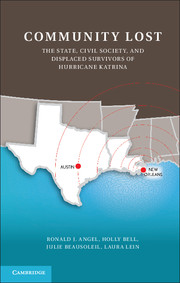Book contents
- Frontmatter
- Contents
- Acknowledgments
- Introduction
- 1 After the Storm
- 2 An Emerging Methodology for a Crisis Situation
- 3 Life before the Storm
- 4 Evacuation and Arrival in Austin
- 5 The Limited Transportability of Social Capital
- 6 Civil Society, NGOs, and the Grassroots Response
- 7 Housing, Employment, and Identification
- 8 Health Care and the Limitations of Civil Society
- 9 The State, Civil Society, and the Limitations of Social Capital
- Bibliography
- Index
1 - After the Storm
The State, Civil Society, and the Response to Katrina
Published online by Cambridge University Press: 05 June 2012
- Frontmatter
- Contents
- Acknowledgments
- Introduction
- 1 After the Storm
- 2 An Emerging Methodology for a Crisis Situation
- 3 Life before the Storm
- 4 Evacuation and Arrival in Austin
- 5 The Limited Transportability of Social Capital
- 6 Civil Society, NGOs, and the Grassroots Response
- 7 Housing, Employment, and Identification
- 8 Health Care and the Limitations of Civil Society
- 9 The State, Civil Society, and the Limitations of Social Capital
- Bibliography
- Index
Summary
CASE STUDY: JUSTINE BETTS, A TALE OF TWO CITIES
Justine Betts, a thirty-nine-year-old African American female, remembered her life in New Orleans, where she was born and had been raised, as “beautiful.” The shared routines of daily life, the familiar places, and her family and neighbors were central to her fond memories of the old city. During our first interview, she bordered on the romantic as she characterized life in New Orleans by saying that. “…you get up in the morning, the birds are singing, the sun is out. Your husband [is] going to work; you going to work; your son going to school. [You] come home from work, sit on your porch with your neighbors, laughing, talking. It was just like a big family.” Yet despite her optimism and the positive attitude she conveyed in our initial interview, it was clear that life in the old city had not always been easy or beautiful. One suspects that Justine’s memories of New Orleans had been made fonder by the contrast to an unfamiliar and sometimes foreign-seeming city and the hardships that she encountered there.
In New Orleans, both Justine and her husband worked at the same restaurant. For many years, the couple had lived in the same rental house close to Justine’s family. The support system and the routines that structured Justine’s life became particularly important when tragedy struck. About three months before Hurricane Katrina, Justine lost her son. The unexpected loss thrust her into a severe depression. Her family was vital in bringing her out of her despair. During our initial interview, Justine reported that just before Katrina struck, she had begun to enjoy life again. Unfortunately, more difficult times and more tragedy were in store.
- Type
- Chapter
- Information
- Community LostThe State, Civil Society, and Displaced Survivors of Hurricane Katrina, pp. 17 - 33Publisher: Cambridge University PressPrint publication year: 2012



